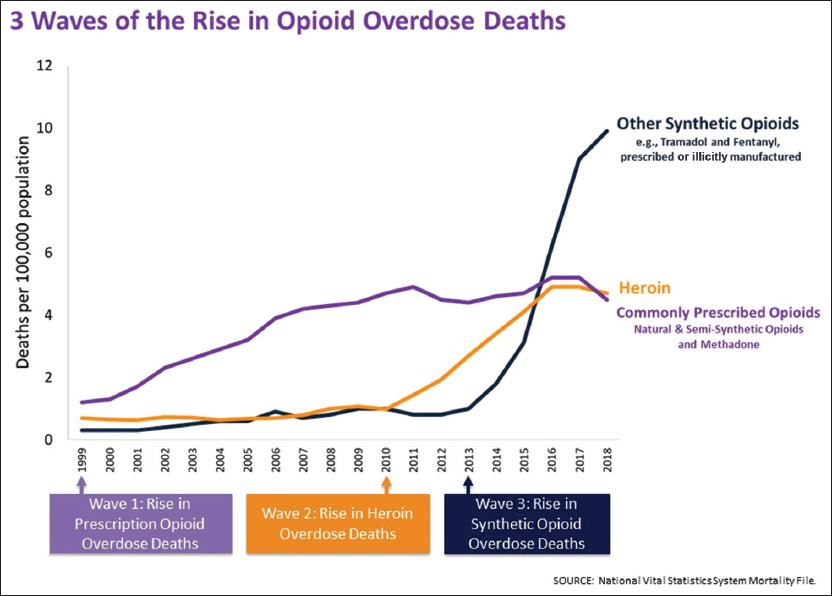Translate this page into:
The U.S. Opioid Crisis: Decriminalization as a Potential Approach
✉Corresponding author email: vluzi1121@gmail.com
Abstract
There have been numerous approaches to treating the opioid crisis, but one downfall is not addressing stigmas against the affected population. It may seem to be a radical proposal, but decriminalizing all drugs may provide safer access to drugs, decrease the number of drug overdoses, decrease the stigma surrounding addicts, and decrease the barriers around access to care for addicts.
Keywords
Opioid
Decriminalizing Drugs
Addiction
Overdose
Drug Abuse
The opioid crisis has affected hundreds of thousands of Americans, and has become a public health crisis due to the mortality rate from drug overdose tripling from 1999 to 2017.1 Opioid use has changed from prescription drug abuse in the early 2000s, to the use of heroin and fentanyl in recent years.2 There have been numerous approaches to treating the opioid crisis, but two primary downfalls are not addressing stigmas against the affected population, and a lack of syringe services programs. Alcohol is an accepted part of our culture and is perfectly legal to purchase over the age of 21, but it is responsible for more deaths than opioids. In 2016 there were approximately 42,000 deaths from opioid overdoses, but in 2017 there were over 57,000 deaths from alcohol related illnesses or injuries.3,4 While there is a stigma against addicts of all kinds, those who use ‘illicit’ drugs are seen as worse. Why is one harmful substance legal whereas another results in years of jail time?
While it may seem to be a radical proposal, decriminalizing all drugs may provide safer access to drugs, decrease the number of drug overdoses, decrease the stigma surrounding addicts, and decrease the barriers around access to care for addicts. In July 2001, Portugal decriminalized all illicit substances, which meant that the use or possession of any drug would not result in criminal action, fines, or jail time.5 Data collected from Portugal from 1999 to 2003 showed that prevalence of drug use among students aged 16-18 increased for any narcotic; the largest increase was in cannabis use.5 Even though the overall prevalence of drug use increased, the reported use of heroin (an opioid) decreased during the same time period.5 Additionally, Portugal reported that the number of people entering heroin treatment centers decreased for the first time, further indicating that heroin use decreased after the decriminalization of drugs.5 The number of deaths from opioids dropped from 350 in 1999 to 98 in 2003, showing another success of decriminalizing drugs.5 Finally, there was a 17% reduction in the number of drug-related HIV cases in Portugal.5 Of course, we must note that opioid use, and use of other drugs, has damaging effects on the physical and mental health of the user. However, it is important to do some pilot studies to see if using under safe circumstances with responsible doses and cleaner drugs may potentially save more lives and prevent unnecessary overdoses, hospitalizations, and infections.

In addition to decriminalizing drugs, an additional approach to the opioid crisis is to decrease the institutional stigmas surrounding drug use. The news media is one of the biggest contributors to this stigma, declaring an opioid ‘epidemic’, which invokes thoughts of isolation or quarantine.1 The news media also speaks more to the criminal justice side of opioid use than speaking to treatment options.1 Reinforcing that opioid users should be criminalized increases their barriers to access for healthcare, education, treatment, and the potential to become drug free. Simply calling opioid addicts, ‘abusers’ evokes a harsh, demeaning, and aggressive stigma upon this group. In a culture where mental health disorders have been to a large extent destigmatized, why has addiction remained a dirty word?
Compliance with Ethical Standards
Conflicts of interest:
The author declares no conflict of interest.
Financial Disclosure:
Nothing to Declare.
Ethics Approval:
Not Applicable.
Disclaimer:
None.
Acknowledgment:
I would like to thank my professors at George Washington University, specifically Dr. Sarah Goodpastor for her expertise and guidance. I would also like to thank my family and friends for their support during my graduate education.
Funding Support:
There was no funding for this study.
References
- Stigma as a fundamental hindrance to the United States opioid overdose crisis response. PLoS Med. 2019;16(11):e1002969.
- [CrossRef] [PubMed] [Google Scholar]
- A public health strategy for the opioid crisis. Public Health Rep. 2018;133(suppl 1):S24-S34.
- [CrossRef] [PubMed] [Google Scholar]
- Alcohol Use 2017 (accessed )
- Discussion Paper. University of Kent. The Effects of Decriminalization of Drug Use in Portugal 2007 (accessed )
- [Google Scholar]





